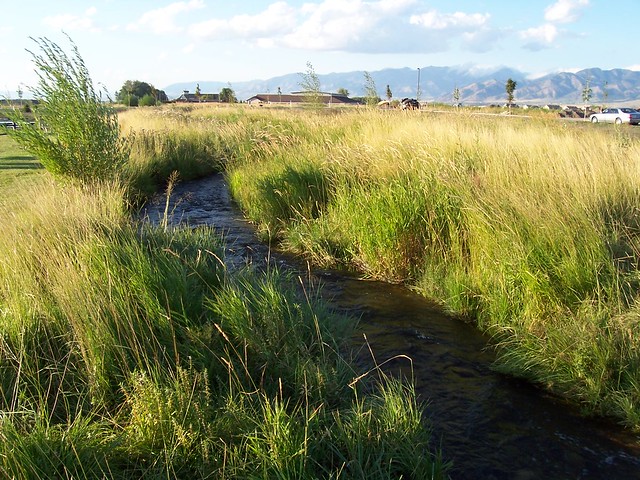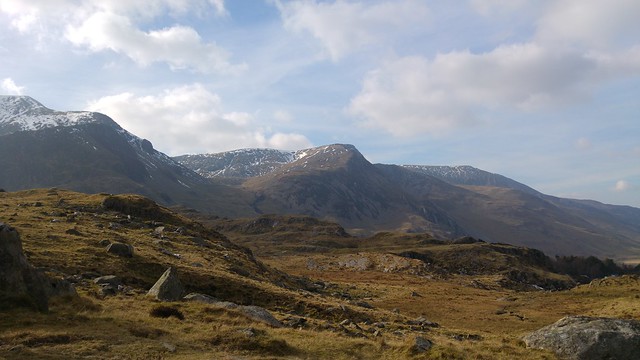Words for ditches, trenches and related words in Celtic languages.
Words marked with a * are reconstructions.
| Proto-Celtic | *klado- = to dig, bury *klādos = trench *kladeti = to dig, thrust *kladyā = digging |
|---|---|
| Gaulish | Vindo-cladia = place name |
| Old Irish (Gaoidhealg) | clad = ditch, dyke claide [ˈkla.ðʲe] = to dig con·claid = to dig, excavate do·claid = to dig up, uproot claidid = to dig |
| Middle Irish (Gaoidhealg) | clad, clod = hole dug in the ground, trench claide = digging, trenching, ditch, trench, excavation claidid = to dig, excavate, undermine clas = ditch, trench, furrow, pit, cooking-pit, burning-pit, grave |
| Irish (Gaeilge) | cladh = ditch, trench (literary) cladhach = ridged, furrowed cladhaire = ditcher claidh = to dig (a trench), build (a dike) clais [klˠæʃ] = water channel, gully, ditch, trench, furrow, rut, groove, deep cut, gash, put, trough, soft mass, large quantity clasach = channelled, trenched, grooved, gashed clasaigh = to channel, trench, gash, groove |
| Scottish Gaelic (Gàidhlig) | cladh [kl̪ˠɤɣ] = burial ground, cemetry, graveyard, ditch cladhach [kl̪ɤ.əx] = digging, dig, excavation clais [kl̪ˠaʃ] = furrow, groove, ditch, drain, gutter, rut, trench claiseach [kl̪ˠaʃəx] = furrowed, grooved, fluted, abounding in trenches/ditches claisean [kl̪ˠaʃan] = small furrow, small groove, small ditch, drain claisearachd [kl̪ˠaʃərəxg] = ditching, act of digging a ditch clais-mhòr = gorge |
| Manx (Gaelg) | clash = channel, cleft, gorge, hollow, furrow, trench, sewer clashal = to trench clashag = furrowed, grooved |
| Proto-Brythonic | *klėðɨd [kle̝ˈðɨːd] = to dig, thrust |
| Middle Welsh (Kymraec) | clad, clat = hole, put, ditch, trench, grave cladedic, kladdedig = buried, interred, dug up cladedigaeth, klydigeth = burial, funeral claddfa = cemetry, graveyard, burial-ground cladu, kladu, kladdy, cladv = to bury, hide, forget, dig, burrow cleis, clais = bruise, would, break, line, groove, rut, fissure, ditch, trench, rivulet |
| Welsh (Cymraeg) | cladd = hole, put, ditch, trench, grave claddedig = buried, interred, dug up claddedigaeth = burial, funeral claddfa = cemetry, graveyard, burial-ground claddu [ˈklaðɨ̞/ˈklaːði] = to bury, hide, forget, dig, burrow, stab, pierce clais [klai̯s/klai̯ʃ] = bruise, would, break, line, groove, rut, fissure, ditch, trench, rivulet clawdd [ˈklaːu̯ð/ˈklau̯ð] = mound, dyke, earthwork, bulwark, boundary, hedge, fence; ditch, gutter, trench, pit, quarry, mine, moat, fosse cloddio = to dig, delve, trench, ditch, excavate clodd(i)wr, clawddwr = ditcher, navvy, digger, miner, quarryman, hedger, excavator mwyn i’r clawdd to be unsuccessful, fail (“to go to the ditch/wall”) |
| Middle Cornish (Cernewec) | cledh, clêdh = dyke, ditch, trench, fence cladhva = a burying place ancledhy = to bury, inter ancledhyas, anclydhyas, encledhyes = burial, funeral |
| Cornish (Kernewek) | kleudh = ditch kleudhik = groove kleudhya = to dig a trench, ditch, excavate ynkleudhva = cemetry, graveyard ynkleudhyans = burial, funeral ynkleudhyas = to bury, inter ynkleudhyer / ynkleudhyores = funeral director, undertaker |
| Old Breton (Brethonoc) | clud = hollow |
| Middle Breton (Brezonec) | creux, cleus, cleuz = hollow, cave |
| Breton (Brezhoneg) | kleuz [kløː(s)] = hollow, slope, earth embankment, fence (of earth), hedge (of thorns, etc) kleuziad kleuz(i)añ [ˈkløː.z(i)ã] = to dig kleuzier |
Etymology: from the Proto-Indo-European *kelh- (to beat, break) [source].
| Irish (Gaeilge) | díog = ditch, trench, drain díogach = trenched, having trenches |
|---|---|
| Scottish Gaelic (Gàidhlig) | dìg [dʲiːg] = ditch, dyke, drain |
| Manx (Gaelg) | jeeg = ditch, gutter, moat, trench jeeig = conduit, cut, ditch, drain, gully, put, trench, waterway, sewer jeeigagh = ditched jeeigit = ditched, drained |
Etymology: unknown.
| Irish (Gaeilge) | fos = prop, buttress, wall |
|---|---|
| Scottish Gaelic (Gàidhlig) | fos [fɔs] = ditch, wall, buttress (archaic) |
| Middle Welsh (Kymraec) | fos, foss = ditch, dike |
| Welsh (Cymraeg) | ffos [fɔs] = ditch, dike, gutter, moat, trench, furrow, groove, pit ffos(i)af, ffosi(o) = to ditch, trench, furrow, chamfer ffosedig = trenched, moated, furrowed, lined ffos gaeedig = drain ffos y clawdd, ffos glawdd = roadside ditch ffos ddyfrio conduit ffos melin, ffos y felin = mill-race |
| Middle Cornish (Cernewec) | fos = ditch, moat, trench, intrenchment, wall |
| Cornish (Kernewek) | fos = wall paper fos = wallpaper toll y’n fos = cash dispenser, ATM (“hole in the wall”) |
| Middle Breton (Brezonec) | fos, foss, fôs = ditch, gap, pit, (river) bed |
| Breton (Brezhoneg) | foz = ditch, gap, sand trap foz disac’hañ = rift (valley), collapsed ditch foz-kronniañ = holding tank, retention pit |
Etymology: from the Latin fossa (ditch, trench, moat, gutter, furrow), from fossa terra (dug-up earth) [source].
| Proto-Celtic | *kʷantyos = flat hill, valley |
|---|---|
| Old Irish (Goídelc) | céite = hill, mound, race-course, assembly |
| Middle Irish (Gaoidhealg) | céide, céite = hill, mound, eminence, open space |
| Irish (Gaeilge) | céide [ˈlʲɛtʲəɾʲ/ˈl̠ʲɛtʲəɾʲ] = flat-topped hill, place of assembly |
| Scottish Gaelic (Gàidhlig) | cèide = market, fair, green, hillock |
| Pictish | ᚘᚐᚅᚈ = hollow |
| Middle Welsh (Kymraec) | pant = hollow, depression, valley, dent |
| Welsh (Cymraeg) | pant [pant] = hollow, depression, valley, dent pant (y) llaw = palm of the hand pant a thalar = hilla and dale, everywhere pantiad = hollow, depression pant(i)af, pantio, pantu = to be(come) hollow, make an impression, sink (in the middle) pant(i)og = hollow, sunken, uneven, holed, sinking, sagging, concave pantir = dale-land, valley-bottom, lowland pantlawr = uneven/concave floor pantlle = hollow, dell, small valley, place full of hollows |
| Cornish (Kernewek) | pans = dell, dingle, hollow |
| Old Breton | pantet = curved, curve |
| Middle Breton (Brezonec) | pant = curved, curve, bend |
| Breton (Brezhoneg) | pant = slope, hillside |
Etymology: possibly from the PIE *kwem-t (hill)
Sources: Wiktionary, Am Faclair Beag, Online Manx Dictionary, Teanglann.ie, eDIL – Electronic Dictionary of the Irish Language, In Dúil Bélrai English – Old Irish glossary, Geiriadur Prifysgol Cymru, Gerlyver Kernewek, Lexicon Cornu-britannicum: A Dictionary of the Ancient Celtic Language of Cornwall, Dictionaire Favereau, TermOfis, Le dictionnaire diachronique du breton, Etymological Dictionary Of Proto Celtic






